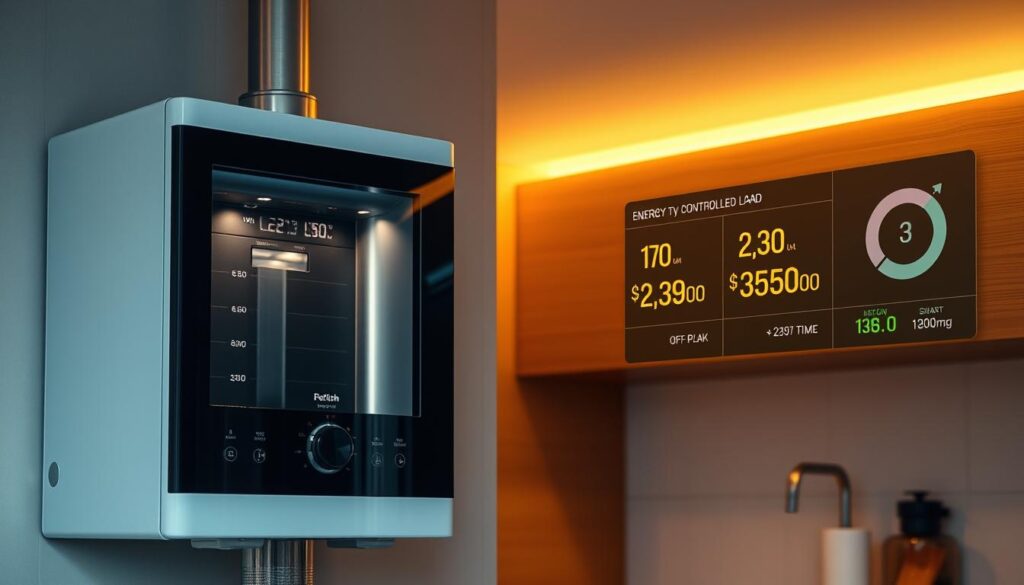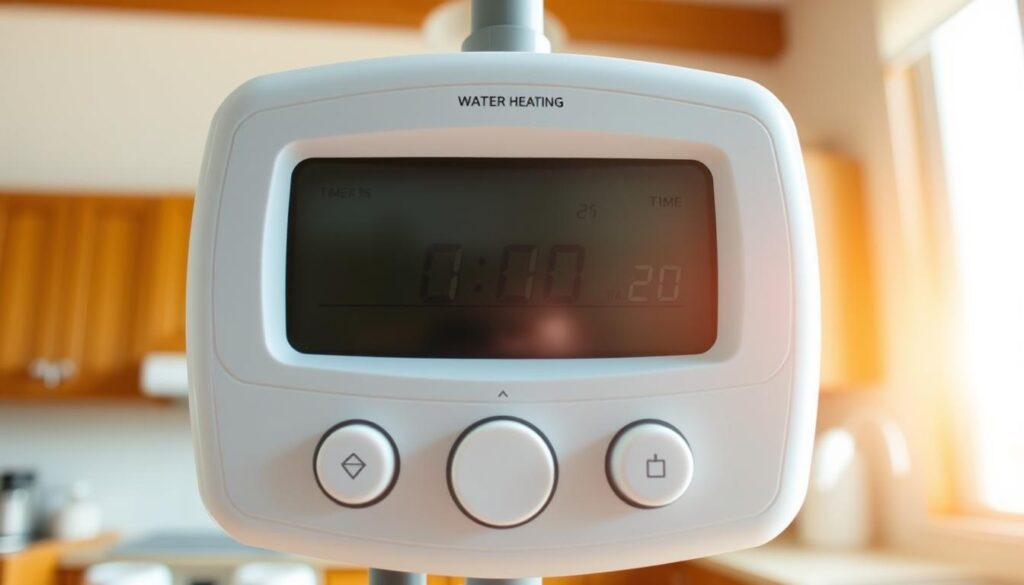We open with practical advice: we help Melbourne homeowners and businesses schedule their hot water to match off-peak pricing and reduce bills, and we offer 24/7 plumbing services for burst pipes, leaks, blocked drains and more.
Our team explains the difference between standard pricing and off-peak options, how off-peak windows like Tariff 93 and Tariff 62 work, and simple timer tweaks that align your systems with cheaper periods.
We flag that network windows change seasonally, and that some economy arrangements need dedicated circuits or a separate meter. If electrical changes are needed, we coordinate with licensed electricians and handle the plumbing side.
For fast help, call OnCall Emergency Plumbers on 1800 571 216 — we use quality brands and materials and focus on affordable, reliable emergency repairs across Melbourne.
Key Takeaways
- Timing hot water use to off-peak windows can cut running costs significantly.
- Tariff 93 and Tariff 62 offer different off-peak hours and rates; check what suits your home.
- Some economy schemes need special metering or wiring to access discounts.
- Network windows change, so keep your scheduling and timers updated.
- We provide 24/7 plumbing support and can liaise with electricians for system changes.
How off-peak electricity and controlled load can slash hot water running costs
Smart scheduling and dedicated circuits let storage cylinders work when prices are lowest. We assess how a simple change can lower bills and reduce peak demand on your household system.
Why plan choice matters
Choosing the right tariff for your hot water can more than halve the effective rate you pay. For example, Aurora’s peak rate sits at 35.4782 c/kWh while its off-peak drops to 16.6862 c/kWh. Tariff 62 (Night Only) offers 14.3078 c/kWh for nine overnight hours plus a daily charge.
Peak, off-peak and controlled load explained
Controlled load supplies appliances in defined windows so reheating happens when costs are low. Moving your storage unit to a separate circuit can keep consumption off primary demand metrics and cut overall charges.
Seasonal and network changes
Networks alter windows to manage flows, especially with rising solar output. We recommend a timer check each season so reheats align with the best rate period.
| Plan | Typical rate (c/kWh) | Window | Notes |
|---|---|---|---|
| Aurora Peak | 35.4782 | Daytime peak | Higher demand charges |
| Aurora Off-Peak | 16.6862 | Off-peak hours | Lower per‑kWh costs |
| Tariff 62 (Night Only) | 14.3078 | 9 overnight hours | Daily charge applies |
We can help — our Melbourne team fixes leaks, valves and cylinders and will coordinate with your licensed electrician for controlled load changes. For urgent leaks or burst pipes affecting your hot water, call 1800 571 216.
energy tariff hot water options across Australia: off-peak windows, controlled load, and metering
Different states set varied off-peak windows and controlled arrangements, so aligning your reheats can cut bills. We outline common examples and the electrical work that may be needed.

Examples of off-peak periods and rates
In Tasmania, Tariff 93 shows a clear split: a peak rate of 35.4782 c/kWh and an off-peak of 16.6862 c/kWh. Weekday peak periods are typically mornings and evenings while weekends are mostly off-peak.
Night-only supply (Tariff 62) runs about 10pm–7am with a unit rate near 14.3078 c/kWh and a small daily charge. Some legacy plans include an afternoon boost (Tariff 61), but that option may be obsolete for new connections.
How controlled load and economy arrangements work
Controlled load supplies selected appliances during cheaper hours only. That suits storage cylinders, pool pumps and EV chargers that do not need constant supply.
Dedicated circuit and metering
Many economy setups require a dedicated circuit back to the meter and, sometimes, a separate meter. Separate tracking usually keeps this consumption off primary time-of-use or demand metrics — confirm with your retailer.
| Plan | Rate (c/kWh) | Typical hours | Notes |
|---|---|---|---|
| Aurora Peak (Tariff 93) | 35.4782 | Weekday peaks | Higher day rate; weekend off-peak |
| Aurora Off-Peak (Tariff 93) | 16.6862 | Off-peak windows | Good for daytime storage |
| Night Only (Tariff 62) | 14.3078 | 10pm–7am | 9-hour night window; daily charge applies |
| Afternoon Boost (Tariff 61) | 15.0356 | 8pm–7am + afternoon | Legacy option; 2pm–4:30pm boost |
We can help customers interpret plumbing implications of moving a storage cylinder onto a controlled arrangement. We advise on cylinder capacity, tempering valves and system health.
For electrical changes, engage a licensed electrician for wiring and metering. For urgent plumbing support in Melbourne, call 1800 571 216.
Timer strategies to match supply windows and minimise costs
Good timer habits let you capture overnight savings and midday solar windows without upsetting household routines.
Setting timers for night-only and middle-of-the-day blocks
For night-only windows (for example 10pm–7am) set reheats so the cylinder is full before the morning. This uses lower rate hours and keeps morning power draw low.
Where networks permit a middle day or “solar soak” block, add a short midday run to absorb excess rooftop generation. Schedule that block after the morning peak so appliances do not clash with household demand.

When to update schedules
Review timers after daylight saving and whenever your retailer or network shifts windows. Prioritise off-peak blocks, disable reheats during morning peaks and keep a contingency hour for extra demand.
- Check annually: confirm timer accuracy to avoid stray reheats.
- Coordinate appliances: run dishwashers and washing outside main reheats.
- Inspect plumbing: we can check valves, tempering and relief to ensure your system suits timer-led reheating.
For emergencies or same-day hot water plumbing support in Melbourne, call 1800 571 216.
Professional setup and emergency support with OnCall Emergency Plumbers
We handle professional setup and urgent repairs so your systems run safely and predictably. Our Melbourne team works with licensed electricians when a dedicated circuit or separate meter is required.
24/7 Melbourne service for hot water systems, leak fixes, burst pipes, and more — call 1800 571 216
We offer rapid diagnosis and repair for cylinder leaks, tempering valve faults, pressure relief issues and pipework that causes heat loss and extra reheats.
- We coordinate with electricians when appliances move to controlled circuits.
- We advise on system selection and sizing to avoid over‑cycling and extend component life.
- We use trusted brands and quality materials for durable outcomes.
- We provide transparent, affordable same‑day services so customers stay safe and comfortable.
For same‑day support or preventive checks, contact our team on 1800 571 216 or visit our page for dedicated hot water repairs in Melbourne.
| Service | What we fix | When we respond |
|---|---|---|
| Emergency repairs | Burst pipes, major leaks, failing cylinders | 24/7 same‑day attendance |
| Planned works | Valve replacement, tempering, pipe insulation | Scheduled visits, preventative maintenance |
| Install & coordination | Dedicated circuits, meter liaison, appliance setup | We liaise with electricians for a safe handover |
Conclusion
Conclusion
We conclude that aligning your hot water with the right tariff and time windows can yield meaningful savings while keeping supply reliable.
Controlled load setups and a dedicated circuit help shift reheats into cheaper electricity periods. Good timers and routine checks keep reheats in off‑peak windows and avoid extra power use.
Keep an eye on network schedule changes and review your plan documents each year. Fixing leaks, faulty valves or a failing cylinder reduces reheats and limits bills.
If your system is underperforming or you need fast plumbing support in Melbourne, call OnCall Emergency Plumbers on 1800 571 216 for 24/7 service.
FAQ
What are our options for off-peak supply and controlled load for electric hot water systems?
We can connect a dedicated circuit or a separate meter to run your electric hot water cylinder on a controlled load. This lets us schedule heating during lower-cost periods — typically at night or designated off-peak windows — so the appliance draws from cheaper supply and reduces day‑time consumption on the main meter.
Why does the choice of rate matter for my household hot water bills?
Choosing the right rate affects when the unit heats and how much you pay. A flat rate keeps costs predictable but can be higher overall. Time-of-use or demand-style plans reward shifting heating to low-cost windows. We assess your usage pattern, hot water size and existing wiring to recommend the best arrangement for savings.
How do peak, off-peak and flat rates compare for running a water heater?
Peak rates apply during high-demand hours and cost the most. Off-peak or controlled load rates apply overnight or at network-specified times and are significantly cheaper. Flat rates charge a steady price all day. For appliances that only need periodic heating, off-peak or controlled load plans typically deliver the best value.
Do network operators change off-peak windows and how will we know?
Yes, distributors can alter supply windows seasonally or due to network changes. We monitor provider notices and can update timers or settings on your controller to match new schedules, ensuring you still benefit from cheaper windows without manual intervention.
What are common off-peak periods and how do they vary across Australia?
Off-peak windows often fall overnight, on weekends or in late evening hours; some regions offer mid-day solar soak periods. Exact hours differ by state, distributor and retailer. We check local schedules — for example in Melbourne or Sydney — and advise which windows align best with your household routine.
What is an economy or controlled load tariff and which appliances suit it?
An economy/controlled load arrangement supplies a dedicated circuit at reduced rates for appliances that don’t need continuous supply, like storage heaters, pool pumps and electric hot water systems. These devices heat or run only during set windows, making them ideal for controlled load plans.
Should we install a separate meter or a dedicated circuit for our hot water system?
A separate meter provides precise billing for the hot water circuit and can be necessary for some controlled load plans. A dedicated circuit without separate metering can still use time‑switched control but may be billed differently. We inspect your switchboard and advise the most cost‑effective compliance and installation method.
How do time-of-use and demand tariffs influence when we should heat water?
Time-of-use and demand tariffs charge more during high-demand blocks and less during off-peak windows. By shifting heating to low-rate periods — for example overnight or during a daytime solar soak — we can lower both energy draw during peak hours and overall bills, especially if you use timers or smart controllers.
How do we set timers for night-only heating and mid-day “solar soak” periods?
We program mechanical or digital timers on the hot water controller to match your retailer’s low-cost windows. For night-only setups we set the heating block overnight; for solar soak we schedule heating during peak photovoltaic output. We recommend checking your system’s thermal storage to ensure sufficient hot water between cycles.
When should we update timer schedules after a network or tariff change?
Update timers as soon as your distributor or retailer notifies you of new windows. We suggest reviewing settings at least twice a year and after any supply notice. Prompt updates keep you on the lowest rate windows and prevent unnecessary daytime heating charges.
Do you provide professional installation and emergency support for hot water systems in Melbourne?
Yes. We offer professional setup and maintenance, including dedicated circuit installation, meter upgrades and timer programming. For urgent issues like leaks or burst pipes in Melbourne, contact our 24/7 OnCall Emergency Plumbers on 1800 571 216 and we’ll attend promptly.
What should we consider when switching to a different plan or installer?
Check whether your current hot water system needs rewiring, a dedicated meter or a switchboard upgrade to qualify for controlled load plans. We review retailer requirements and provide a clear quote for any electrical work, plus advice on how tariff windows and appliance schedules affect running costs.
